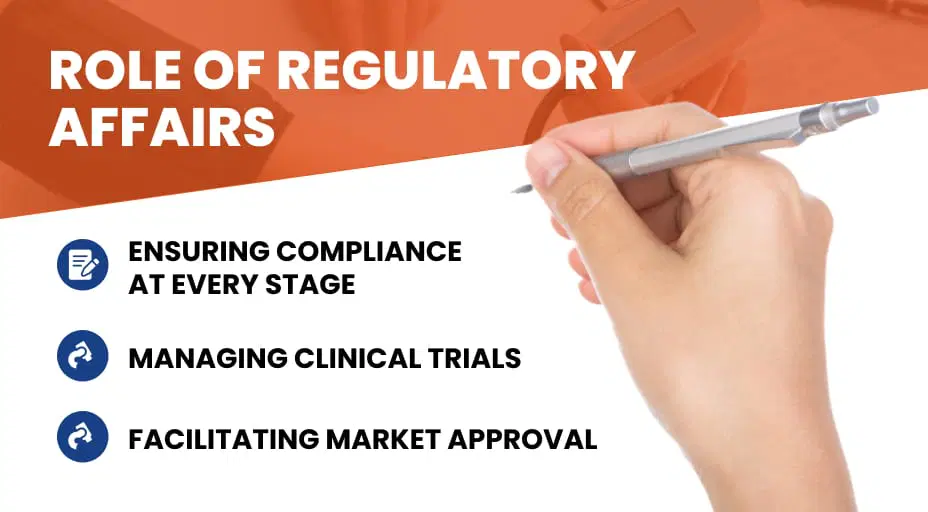Regulatory affairs is critical for the successful approval of new drugs. Regulatory affairs consultants and professionals guide the complex journey from pre-clinical to market, managing rigorous testing, compliance with global standards, and ensuring drugs are safe and effective for consumers. Their role not only upholds industry integrity but also protects public health.
The multifaceted responsibilities of regulatory affairs professionals are nuanced, so we’ll explore how they navigate legal frameworks, manage compliance at every stage, and shepherd drugs through to approval.

The Role of Regulatory Affairs in Drug Development
Regulatory affairs play a pivotal role in drug development, guiding new drugs through every stage of the process. From navigating legal frameworks and global guidelines to ensuring compliance with regulatory bodies like the Food and Drug Administration (FDA) and European Medicines Agency (EMA), these professionals maintain the integrity of the pharmaceutical industry. Regulatory affairs also provides strategy for navigating the complex landscape of regulatory requirements governing the development, approval and marketing of pharmaceutical products.
Regulatory affairs oversee clinical trials, manages submissions, and handles the transition from approval to market launch. Helping to facilitate timely and successful submission of regulatory applications (such as Investigational New Drug applications, New Drug applications, etc.) to regulatory authorities like the FDA, EMA and other global regulatory agencies.
Ensuring Compliance at Every Stage
Navigating legal frameworks and global standards is a complex task that regulatory affairs professionals handle with precision. They ensure compliance with regulatory guidelines from entities such as the FDA in the United States and the EMA in Europe, making sure that drugs meet the standards necessary for regional and international markets. This adherence extends through every phase of development, with regulatory affairs experts overseeing ongoing monitoring and audits to maintain compliance and address issues promptly.
Managing Clinical Trials
Clinical trials are a critical stage in drug development, and regulatory affairs professionals play a key role in overseeing their design and execution. This includes ensuring that trial methodologies are scientifically sound and ethically conducted, yielding reliable data that meets regulatory standards. Sometimes, there is a specific project manager. The professionals review and validate these results before submission to regulatory bodies, ensuring that all data is accurate and comprehensive and meets the rigorous requirements set by the FDA, EMA, and other regulatory entities.
Facilitating Market Approval
Regulatory affairs professionals prepare and submit the necessary dossiers for market approval, which include detailed information on a drug’s safety, efficacy, and manufacturing processes. This provides a comprehensive overview for regulatory bodies, enabling them to make informed decisions. Additionally, regulatory affairs professionals manage queries and feedback from these bodies, offering clarifications and additional information as needed. Once approved, they oversee the transition from approval to market launch, ensuring all compliance measures are in place for manufacturing, distribution, and marketing, facilitating a seamless entry into the market.

How Regulatory Affairs Protect Public Health
Regulatory affairs professionals play a crucial role in the safety and effectiveness of drugs reaching the market, preventing unsafe products from causing harm to the public. Their oversight begins with a comprehensive evaluation of drug safety profiles, followed by risk management strategies to address potential hazards.
This ongoing responsibility extends beyond initial approval, with post-market surveillance and pharmacovigilance making sure that the drugs on the market continue to meet safety standards.
Preventing Unsafe Drugs from Entering the Market
Regulatory affairs professionals serve as gatekeepers so that only safe and effective drugs reach the market. This begins with thoroughly evaluating drug safety profiles and examining potential risks and benefits. Regulatory affairs teams make sure that drugs meet stringent safety standards by identifying and addressing these risks through comprehensive risk management strategies.
Oversight extends beyond initial approval, with post-market surveillance and pharmacovigilance for ongoing safety and monitoring of adverse effects. This proactive approach protects consumers, preventing unsafe drugs from remaining on the market.
Balancing Innovation with Safety
Regulatory affairs play a delicate role in supporting the development of new and innovative treatments while maintaining rigorous safety standards. They work closely with pharmaceutical companies so that compliance doesn’t hinder medical advancements, guiding drugs through complex legal frameworks and regulatory standards.
This includes streamlining approval processes for life-saving drugs. This balance between innovation and regulation safeguards patient-focused drug development to protect public health while allowing for medical progress.
Challenges and Opportunities in Regulatory Affairs
The evolving global regulatory landscape presents both challenges and opportunities.
Evolving Regulatory Landscape
Adapting to changes in global regulations and standards is crucial, as new guidelines impact how drugs are developed, tested, and approved. This requires staying abreast of these changes so that development processes align with evolving standards and drugs meet the regulatory requirements for approval and market entry.
Technological Advancements in Regulatory Affairs
Technological advancements, particularly digital tools and AI, are revolutionizing the field of regulatory affairs. These technologies streamline compliance and submissions by automating data collection, analysis, and reporting, reducing the time and effort required for regulatory processes.
Additionally, technology provides opportunities for optimizing the approval process, allowing regulatory affairs professionals to manage submissions, communications, and monitoring more efficiently, thereby speeding up the journey from development to market.
Global Regulatory Harmonization
Another challenge and opportunity in regulatory affairs is the push for global regulatory harmonization. Standardizing drug approval processes worldwide can simplify the journey from development to market, reducing duplicative efforts and allowing drugs to reach global markets more quickly.
However, navigating differences between regional regulatory bodies remains a challenge, as varying standards and requirements can create hurdles. Professionals must balance these differences, working towards harmonization while maintaining compliance with each regulatory body.
A Balancing Act for Better Health
Regulatory affairs play a vital role in the drug development process, navigating a complex landscape for safety, compliance, and efficacy at every stage. From guiding clinical trials to managing regulatory submissions, these professionals safeguard the pharmaceutical industry and protect public health.
Balancing innovation with safety and overcoming global regulatory challenges, regulatory affairs professionals continue to shape the development and approval of new drugs.
